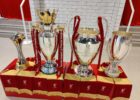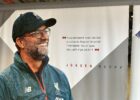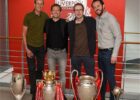Let’s be honest, there isn’t loads to talk about in the world of football. Even an article about whether the Premier League season will be completed or cancelled altogether is nothing more than speculation. Instead of going down that road, I figured it would be easier to take a more retrospective look at goings on at Anfield. For that reason, I’ve decided to have a look back at Jürgen Klopp’s Liverpool tenure so far. It’s already happened, so there can be no question of any of the games being called off or competitions cancelled; even if we might wish that that were the case. I thought it would be wise to look season by season rather than across the entire tenure in one sweeping article. There’s no better place to start, therefore, than with the 2015-2016, which started poorly under Brendan Rodgers but saw a massive lift in October when the German was brought in to replace him. As decisions go, that wasn’t a bad one by Fenway Sports Group!
CONFIRMED: Liverpool appoint Jurgen Klopp as new manager pic.twitter.com/0p2gdPNKFc
— elevenelevengang (@elevenelevenlfc) October 9, 2015
For the record, I wasn’t one of the people who had it in for Brendan Rodgers during his entire time in charge. I loved him for what 2013-2014 was and I will always find the suggestion that Liverpool’s success was completely thanks to Luis Suarez to be laughable. Yet I have to admit that as soon as we lost 6-1 to Stoke City on the final day of the 2014-2015 campaign, he should have been given his marching orders. That he wasn’t left him open to all sorts of criticism that I felt was undeserved and I personally wish him well in his future career. He’s doing well for Leicester City and, as long as it doesn’t impinge on Liverpool’s success, long may that continue. He always had the feel of a dead man walking from the moment the new campaign got underway, so the second results turned against him it wasn’t a surprise to see him get the boot. What was somewhat surprising was just how quickly Klopp managed to turn the mood around.
From Doubters To Believers
It’s become a cliché now, but it really can’t be overstated how much work Jürgen Klopp had on his hands when he arrived at Anfield. Pretty much everyone around the place had lost their way, from the players on the pitch to the supporters in the stands. The belief in some quarters looking back is that the German was appointed and it was all rosy from there, but that’s not the case. The loss to Crystal Palace, after which he said that he felt ‘pretty lonely’ when he saw people streaming for the exits after Scott Dann scored, was Klopp’s fourth match in charge. Whilst ‘doubters to believers’ and ‘The Normal One’ might the phrases most commonly associated with him, I think his declaration that ‘we decide when it’s over’ has been the most influential one. The most important part of Klopp’s reign so far has been the fact that he couldn’t care less what other people think, as long as he wins over supporters and his players.
Rival fans mocked LFC and Klopp for going to the Kop after a late equaliser against West Brom. For me this signalled a turning point! Players and supporters alike bought into Jürgen Klopp! ♥️ YNWA pic.twitter.com/PTqVHAzfaB
— Mr Clarke (@jonnylonglegs80) October 8, 2019
Never was that more evident than after the late equaliser against West Brom, when the manager decided to take his players to the Kop end of Anfield and line up, celebrating. It wasn’t about achieving a draw against the Baggies and the German knew how it would be perceived in some quarters. It was about celebrating his team keeping going and the supporters sticking with them. If the Crystal Palace loss was the moment the ship started turning around then the West From game was when the manager felt it was pointing in the right direction. He didn’t care that he was going to be widely mocked by opposition supporters and even some of the club’s own fans. Jürgen Klopp knew that if he could get as many people as possible pulling in the same direction then there was a real chance that the combination of the supporters and the players could help his embryonic side achieve something great. The groundwork was laid.
Cup Adventures
The league form in the 2015-2016 season wasn’t great, with the Reds eventually finishing eighth. Yet there were mitigating circumstances around that. We’d won just three of our first eight games before Klopp’s appointment and only won three of our next nine after his arrival, so we were never likely to do brilliantly. Where we could find form was in the cup competitions and Liverpool didn’t disappoint. The League Cup journey was a fun one, even if it ultimately ended in disappointment. It took penalties for Manuel Pellegrini’s side to get past us, though, proving that the manager had instilled a decent amount of belief in his team since arriving. That was far more evident in the Europa League exploits, emerging from the Group Stage undefeated before having to take on our old rivals Manchester United in the round of sixteen. A comfortable 2-0 home win was pleasant, but the manner in which Philippe Coutinho danced through their defence to equalise at Old Trafford was exquisite.
Coutinho scored goal at Old Trafford, #OTD in 2016 #UEL | @LFC pic.twitter.com/tOKFBouV3P
— UEFA Europa League (@EuropaLeague) March 17, 2020
It set the stage for an emotional clash between Jürgen Klopp’s new team and his old one, with Anfield absolutely bouncing for the second-leg. If the defeat to Crystal Palace and the celebrations in front of the Kop after the draw with West Brom were building up to anything then it was surely this. After a 1-1 draw in Germany, the Reds looked to be heading out at the quarter-final stage when Henrikh Mkhitaryan and Pierre-Emerick Aubameyang gave Dortmund a 2-0 half-time lead. Hope supplied by Divock Origi was quickly snuffed out when Marco Reus made it 3-1. The idea of Liverpool deciding when it’s over was proven when goals from Coutinho, Mamadou Sakho and Dejan Lovren gave Anfield another of its famous European nights. The Klopp mystique was being put in place, with Liverpool’s never-say-die attitude under him being established. The loss to Sevilla in the final showed that improvements could be made, but green shoots were sprouting.



